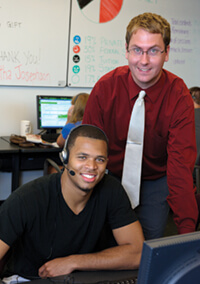Can We Talk?
Telefund callers learn life lessons — and a new appreciation for private support.

Brad Green, assistant director of annual giving at the UW Foundation (standing), here with Telefund student Marcus Cromartie x’12, says callers enjoy their conversations with alumni. Photo: James Gill
Every year, some three hundred students learn firsthand about the power of private support for UW-Madison. As callers for the UW Foundation’s Telefund, they contact alumni, donors, and parents; explain opportunities for support; and ask for gifts.
Their efforts pay off. Since that first phone number was dialed in 1983, students have raised almost $70 million for their university.
Forty students inaugurated Telefund — then named “Wisconsin Calling.” Brad Green ’05, assistant director of annual giving and himself a former caller, estimates that since it began, thousands of students have worked for the program. Shifts are 5:30 to 9:00 p.m. Monday through Friday; 2:00 to 5:00 and 5:30 to 9:00 p.m. on Sunday; and noon to 3:00 p.m. on some Saturdays. Students work a minimum of three shifts per week, with forty-four callers and three student managers on each shift. “We operate year-round, but are closed on holidays or times when it is not appropriate to call,” says Green, noting that Super Bowl Sunday is one of those times.
The experience earns students a paycheck to help finance their education and provides life lessons about listening, being persistent, and managing time and tasks.
Sarah Selz ’09 began working with Telefund nearly four years ago and is now a student manager. “I will be teaching English in Korea and hope some- day to work on education policy,” says Selz, who graduated with a degree in German and English TESOL (Teaching English to Speakers of Other Languages). “This job has taught me how philanthropy relates to education, but it also is a good way to learn how to be in charge and not overthink — to be decisive and move on.”
There are other benefits. “Talking to people? I love that,” says Caitlin Cusack x’10, a communication arts major. She remembers a conversation with a ninety-two-year-old journalism school graduate, adding, “Alumni are the most interesting and some of the nicest people. And many of them are so happy to give back.”
Samantha Overgaard x’12, a Telefund veteran of two and a half years who is majoring in journalism and communication arts, recalls speaking with a graduate who attended the UW during the Vietnam War protests and who told her about a campus that was much different from the one she knows today.
The job is not for everyone. While some students stay only a few sessions, others discover a hidden talent, develop a new skill, learn to handle rejection, and build self-confidence. “I usually tell people it’s a tough job to ask someone for a gift,” Green says. “But so many students find that they love talking to alumni about their experiences, [and] that it gets easier.”
Overgaard says she started making calls with some trepidation, but quickly changed her mind. “It’s not as scary as it seems,” she says.
Seamus Fitzgerald x’12, a history major and a UW Foundation summer intern, not only found a home with the Telefund, but also a future career. “After a while,” he says, “I enjoyed being part of a community that makes so much possible. This has influenced me about majoring in nonprofits.” He hopes to add a second major in community and nonprofit leadership in the School of Human Ecology.
Deans, vice chancellors, and directors — even the chancellor — stop by the Telefund’s call center at the UW Foundation to tell callers about priorities and funding opportunities. The updates help the students to answer questions, share news about specific schools or departments with alumni, and provide exposure to areas of campus beyond their own academic and social spheres.
Callers gain a perspective that many students don’t have until after graduation. “Students have no clue about the foundation or what private support is,” says Overgaard. “Think about it. [Support] comes from somewhere. People before them gave so they could be here.”
“It’s not just about me,” adds Fitzgerald. “I realize my education is provided by the eighty thousand people who give to the university. The UW is what it is because so many people care.”
Published in the Fall 2010 issue

Comments
No comments posted yet.